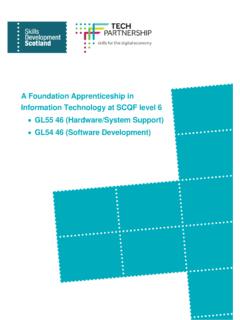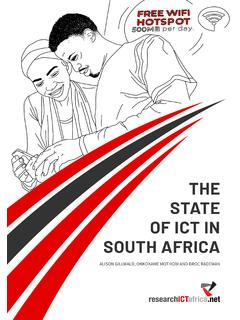Transcription of Climate Emergency Skills Action Plan 2020-2025
1 Climate Emergency Skills Action plan 2020-2025 Key Issues And Priority ActionsWhen we first announced that we would develop a Climate Emergency Skills Action plan last year, we were directly responding to Scotland s declaration of a Climate Emergency and our increased legislative targets to meet net zero emissions by 2045. This transition will transform our economy and society, including the kinds of jobs we do and Skills we need to thrive in a net zero economy. Now, facing rising unemployment following the economic downturn from COVID-19, this focus on supporting people into good, fair, green jobs is more important than ever. Enhancing access to Skills training is critical for successful decarbonisation and will help create new, high-quality green jobs, enhanced regional growth, and improved access to growing green markets across the globe for Scotland s diverse businesses.
2 Key to our Roseanna CunninghamCabinet Secretary for Environment, Climate Change and Land ReformJamie HepburnMinister for Business, Fair Work and Skillstransition to net zero is ensuring that everyone can benefit from the opportunities and no one is left behind. This is what we mean by a Just Transition . This approach also recognises that we can only achieve this transformation if we all work together and everyone is enabled to play their part. Ensuring people have the Skills to engage and succeed in Scotland s green recovery from COVID-19 and transition to net zero is at the heart of this Climate Emergency Skills Action plan . The Skills system has a key role to play in responding to changing demand and supporting individuals, in all communities, to access emerging opportunities.
3 We recognise that any labour market disruption must be mitigated by investment in Skills to support people to move into sustainable jobs in the net zero economy. This includes not only the specific technical Skills that may be needed to achieve a just transition, but also the higher-order and general Skills that will be required. The Climate Emergency Skills Action plan sets out a clear direction for the reorientation of our Skills system, and signals the role that businesses, communities and individuals across Scotland will play in achieving this. As a Government we have set out a series of ambitious decarbonisation targets and policies to support Action towards these targets, and this plan forms a key part of our plans to achieving ForewordAs its effects become increasingly evident in the world around us, Climate change has become one of the defining issues in recent has moved up the agenda politically, socially, culturally and economically, with Green Recovery and the transition to a net zero economy being a central theme in the Programme for builds on legislation passed last year setting the target of reducing Scotland s net emission of all greenhouse gases to zero by 2045 at the latest.
4 Energy transition and the decarbonisation of transport have been targeted as areas of opportunity and growth, and in November 2021 the eyes of the world will fall on Scotland as Glasgow hosts the 26th UN Climate Change many years this has been central to my work as chief executive of SP Energy Networks, with the surge in demand for renewable energy needing to be met not only by changes in infrastructure, but changes in our Skills base as is why I am acutely aware that Scotland s Climate Emergency response with a Skills By Frank MitchellChair, Skills Development Scotland and Chief Executive, SP Energy Networkstransition that allows us to grasp the opportunities open to us and overcome the challenges that the next two decades the core competences of a wide range of jobs need to be made more directly relevant to the needs of a low carbon economy, and with the majority of the 2045 workforce already in employment, the primary challenge for Scotland is about iterative means updating and refocusing people s Skills so they can contribute to rising productivity and help Scottish firms capture a share of growing international the Climate Emergency is in itself a defining challenge, we must acknowledge it is happening while employment and Skills are being reshaped by digitalisation.
5 Automation and the response to disruptive forces complicate public policy responses, but they also offer a window in which we can improve the Skills of people in declining or vulnerable sectors of employment. Meaningful collaboration is required across many agencies and partners to face up to this task, as Climate change is a cross-cutting issue requiring consideration within all strategic decision-making. The Skills system must play its part managing the transition so it can quickly enable more individuals and businesses to prosper in a shifting development of this Action plan has been supported by a wide range of individuals and organisations who helped identify and prioritise the key actions which will address these Skills challenges and draws on the existing evidence base to set out the nature and scale of the long-term Skills challenge presented by a move to net zero in the context of a just transition, and identifies immediate actions to support the development of the Skills needed to meet the Climate change challenge, particularly in relation to sectors identified as key to the transition to net addition.
6 It identifies longer-term actions that will allow the Skills system to respond more effectively and sets out a route map that will allow for the Climate Emergency Skills Action plan to function as a responsive and evolving s ForewordExecutive Summary 5 Chapter 1: Building a Climate Emergency Skills Action plan for Scotland 8 Chapter 2: Supporting Net Zero: The Contribution of Skills 12 Chapter 3: Opportunities and Skills Implications 20 Chapter 4: Priority Areas for Skills Action to Support the Transition to Net Zero 34 Chapter 5: Delivering the Climate Emergency Skills Action plan 54 Glossary 56 Contents1.
7 At a time when Scotland is focusing on its response to COVID-19, facing the challenges of Brexit and adjusting to increasing digitalisation, the Climate Emergency remains the single biggest long-term challenge. 2. Reaching the target of zero greenhouse gas (GHG) emissions by 2045, with a 75% reduction by 2030, will require transformational change across the economy and society, and will provide significant opportunities for: developing new, quality green jobs embedding green and circular economy Skills increasing access to growing global green markets for Scottish businesses stimulating regional growth providing enhanced access to nature and the environment. 3. The economic downturn and consequent unemployment brought about by COVID-19 has provided an opportunity for a green recovery, with Scotland s strategic response to recovery and renewal reinforcing the need for a focus on jobs and Green jobs include those in renewable energy, the circular economy and zero waste, and the nature based sector with wider green Skills sitting on a spectrum ranging from highly specific requirements in sectors directly supporting the transition to net zero such as energy, transport, construction, agriculture, and manufacturing, through to more generic requirements across all sectors to thrive in a net zero economy.
8 5. Green jobs can be categorised as: new and emerging jobs that relate directly to the transition to net zero hydrogen cell technicians, carbon monitoring technicians, and urban miners jobs affected by the transition to net zero that will need enhanced Skills or competencies architects and environmental consultants existing jobs that will be needed in greater numbers as the result of the transition to net zero insulation installers, energy assessors and designers and multiskilled on-site Summary 56. Technical Skills will be key, but soft Skills will also play an important role in driving behavioural change, communicating to businesses, communities, and individuals the ethics and urgency of these changes and ultimately the benefits of the transition to net The Skills system has a key role to play in responding to changing demand and supporting individuals, in all communities, to access emerging opportunities.
9 We recognise that any labour market disruption must be mitigated by investment in Skills to support people to move into sustainable jobs in the net zero economy. This includes not only the specific technical Skills that may be needed to achieve a just transition, but also the higher-order and general Skills that will be required. 8. The CESAP has been developed through engagement with Industry Leadership Groups and an Expert Group comprising Skills Development Scotland, the Scottish Funding Council, Zero Waste Scotland, the Scottish Cities Alliance, NatureScot, Scottish Government s Domestic Climate Change and Skills Divisions, Highlands and Islands Enterprise, Scottish Enterprise, South of Scotland Enterprise, the University of Edinburgh and the University of Strathclyde.
10 69. Potential opportunities for jobs growth and Skills implication were identified across five broad areas of economic activity that will make a significant contribution to net zero transition. These areas reflect national priorities and investment within the Scottish Government s Programme for Government to reduce energy demand and greenhouse gas emissions and adapt to Climate change: Energy transition (including oil and gas, on and offshore wind, hydrogen, electricity, carbon capture and storage) Construction (including the retrofitting of housing and non-residential properties) Transport (including road transport, railways, domestic aviation, shipping and aircraft support vehicles) Manufacturing (with a focus on engineering) Agriculture and land use management (including forestry).
















